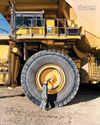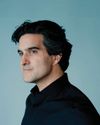
A SNARKY REMARK by my friend Kevin changed everything I thought I knew about surfboards. After parking in front of his house by San Francisco's Ocean Beach, I unloaded the hefty eight-foot surfboard that guys like us ride when we reach middle age. But Kevin, 62, appeared with a snazzy little 6-foot-4-inch shortboard that looked like something 11-time world champion Kelly Slater would have ridden in his heyday.
Shortboards are like Formula One race cars insanely fast and fun, but super hard to ride. Kevin and I both gave them up back in the 1990s. And yet, here was Kevin scoffing at my big old-dude board with a friendsdon't-let-friends vibe, and saying, "Is that really what you're riding?"
I thought he was deluded until we hit the water. Kevin caught a wave and slashed the biggest turn I'd seen him make in decades. We traded boards and I noticed that Kevin's new toy was wider, thicker, and flatter than the shortboards of the '90s, which were famously potato-chip-thin and highly curved from nose to tail. It surfed like a dream: I caught a wave, ripped around like an adrenalized kid, and realized that something profound has changed in shortboard design.
I did some Googling over a post-surf burrito and learned that the revolution in contemporary surfboard production has two distinct parts: First, new shaping techniques have made shortboards much easier for older and bigger surfers to enjoy; second, top surfboard companies like Channel Islands, Lost, and Pyzel have pioneered an unusual fusion of artisanal craftsmanship and computerized efficiency to let any surfer anywhere order one of these shortboards perfectly customized to their own skill level, body size, and surf conditions-all for about $1,000.
This story is from the {{IssueName}} edition of {{MagazineName}}.
Start your 7-day Magzter GOLD free trial to access thousands of curated premium stories, and 9,000+ magazines and newspapers.
Already a subscriber ? Sign In
This story is from the {{IssueName}} edition of {{MagazineName}}.
Start your 7-day Magzter GOLD free trial to access thousands of curated premium stories, and 9,000+ magazines and newspapers.
Already a subscriber? Sign In

THE NEW GOLD RUSH
Gold prices have soared amid global uncertainty and a central-bank-driven buying spree. But this time, the gold mining industry looks very different.

A New Season for Giving
As the PGA TOUR kicks off its 2025 season alongside its sponsors in Hawai'i, the organization is continuing to make an impact in local communities.

WELCOME TO ELONTOWN, USA
The small town of Bastrop, Texas (pop. 12,000), has become a home base for Elon Musk's business empire. What comes next is anyone's guess.

100 MOST POWERFUL PEOPLE
Our inaugural, authoritative ranking of the leaders whose innovation and impact have elevated them to the top of the business world.

ARE CEO SABBATICALS THE ULTIMATE POWER MOVE?
WHEN VENTURE capitalist Jeremy Liew and his wife were dating, they talked about how one day they would take a year to travel the world. \"That's how we'd know we'd made it,\" Liew says.

WHAT ARE THE BEST METRICS FOR MEASURING A STARTUP'S POTENTIAL?
IN HIS 2012 ESSAY \"Startup = Growth,\" Paul Graham talks about a 5% to 7% weekly growth rate as table stakes for startup success. If you're growing 10%, he says, you're doing \"exceptionally well.\"

TECH POLYMARKET'S ELECTION ACCURACY MADE SHAYNE COPLAN A STAR-BUT AN FBI RAID POINTS TO TROUBLE AHEAD
IN NOVEMBER, Shayne Coplan had a week he'll remember for the rest of his life: He got a phone call from the highest echelons at Mar-a-Lago. He went on TV for the first time. And his New York City apartment was raided by the FBI.

WHY BIG TECH IS THE NUCLEAR INDUSTRY'S NEW BEST FRIEND
OVER THE PAST several years, Big Tech firms like Google and Microsoft have trumpeted ambitious plans to go carbon-neutral, or even carbon-negative, by 2030. But then the generative-AI boom came along and threw a giant wrench in their plans.

WHAT PALMER LUCKEY, THE MAN REVOLUTIONIZING WARFARE, IS AFRAID OF
PALMER LUCKEY, the founder of the $14 billion Al-powered weapons startup Anduril, has become the face of change in the defense industry.

GLOBAL BUSINESS BRACES FOR TRUMP 2.0
AROUND THE WORLD in 2024, voters chose change: in South Africa, France, Britain, and Japan. But nowhere does the anti-incumbent trend matter more than in the United States.